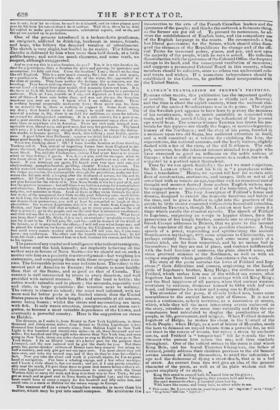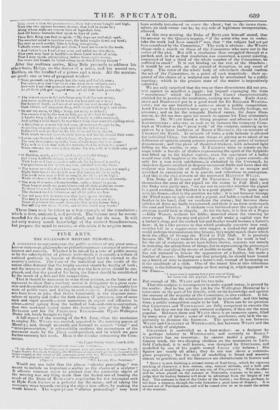L ATHAM'S TRANSLATION OF TEGNER'S FRITHIOF.
Best DES other merits, this publication has the important quality of novelty. The scene of the poem is chiefly laid in Norway; and the time is about the eiehth century, when the national cha-
racter of the ancient Scandinavians was in its prime. The object of the Swedish poet appears to have been to portray the manners of his countrymen, with as much amiability as consisted with truth, and with as much fidelity as the refinement of the present
age would bear. The sources whence TEGNER has drawn his ma- terials for this purpose are chiefly the Sagas, or nmetrieo-legendary
histery of the Northinen ; and the story of his poem, founded in a tneasure upon two old Sagas, has sufficient attraction in itself, and is well contrived as a vehicle for exhibiting the love, the superstitions, the national customs, and the hardy virtues, slightly dashed with a few of the vices, of the old Nerthmen. The sub- ject, moreover, has the inherent interest attached to a people who have exercised so great an influence on the noble nations of Europe : what is still of more consequence to a reader, the work animated by a poetical spit-it throughout. Thus far we can speak decidedly : the rest we must coejecture,
for Mr. LATHAM admits that his le ok is " a paraphrase rather than a translation." Hence, we cannot tell how far certain arti- fices of construction, sentiments, and images, little or not at all
accordant with so remote an age, together with an occasional cast of thought and manner derived from modern English writers, may be exaggerations or interpolations of' the translator, or belong to
the original poem. The long description of Frithiot's house and domain, designed to exhibit the domestic furniture and habits of the time, and to give a further insight into the practices of the people by little stories connected with certain household valuables, is doubtless TEGNER'S, though Mr. Isseueet may have given it a tinge which recalls the classical episode. The speech of Frithiof to Ingebore, suggesting an escape to happier climes, from the persecution of her kingly brother, reminds one so strongly of the Greek Corsair addresses in BYRON, that we place to the account
of the ttanelator all that gives it its peculiar character. A long speech of a priest, expounding and spiritualizing the ancient Scandinavian mythology, with some allusions to Christianity, are perhaps entirely Swedish. These, and some minor points of a similar kind, are far from unpoetical, and by no means bad in themselves : but they are out of place, and contrast indifferently with the bold freedom of manners, the plain shrewd sense, and stern practical stoicism of the Northmen, as well as with an antique simplicity which generally characterizes One work. The story of the poem narrates the loves of Frithiof and log- ebore ;* their difficulties and crosses, originating in the family pride of Ingebore's brother, King Helge; the restless misery of Frithjof, which makes him one of the wildest sea rovers, after lngebore has been forced into it marriage with old King Ring ; and the final happiness of all parties, when that ancient warrior, overtaken by sickness, dismisses himself to Odin with his' own leind, and bequeaths his widow and young son to Frithiof. The structure of the poem, it' closely looked into, bears some resemblance to the ancient heroic epic of Greece. It is not so much a continuous, orderly narrative, us a succession of scenes, which, while they tell the most interesting events embraced in the story, introduce at the sante time naturally and fitly the cir- cumstances best calculated to display the peculiarities of the people, in life, government, and religion. When Frithiof demands ingebore of Helge, he makes his claim in the Cannel' of the
whole People ; when Helge, as a sort of labour of Hercules, sends the hero to demand an unpaid tribute from a powerful foe, he will not trust to the course of events, but raises a storm by enchant-
meets, and Frithiof is " tempest-tort" till he wounds the two daemons who pursue him across the sea; and thus similarly throughout. One of the noblest scenes in the poem is that where King Bele, and his friend Thorsten Vikingsson, the father of Frithjof', jointly address their children previous to the old Scandi- navian custom of killing themselves, to avoid the infirmities of age and the dishonour of dying a straw-death, that is in a bed of straw. An extract from tins will give an idea of the general character of the poem, as well as of its plain wisdom and tine quaint simplicity of its style. •
King Bele stood in council hail, lie leaned him on his glaive ; Beside him Thorsten Yikingsson, that yeomen bold and brave, His aged warrior.brother; a hundred years bad lie, With scars like runes, and hoary hair, so silver white to see.
• This name, Mr. LsTo st tells us. must he prom ott ;: " aloe as iu " net " In.gebure,' still less " !ajar r They stood (.thin the piassneed.ail, their luobs were bought and high,
Were like two ancient heathen shrines, that half in ruins lie ;
Along whose walls are careen lines of legendary lore, And old heroic histories that speak to days of yore.
Then Bele King was first to speak, " My days are well-nigh sped, The sweetest mead is tasteless now, the helm weighs deign my head ;
But ever as each earthly bliss is failing into gloom,
Valhalla seems more bright and dear, I turn me towards the tomb.
" And hither have I called my sons, and called me also thine,
That each may hear in heedfulness these latest words of mine,
That I may speak, admonishing, before those ea:4Ias young, Ere voice and breath be lulled asleep upon this filtering tongue."
After the auditors arrive, King Bele proceeds to address his eldest-born, Beige, on the duties of a ruler, and his second son, Balfdan, on the conduct of a prince anti a man. All the maxims are good; one or two of pregnant wisdom
"None presseth on his people but the vain and fool:sli man ; Fur ciders may but hope to do e'en what their subjects eau ; And sure I am that greenest crests of tallest trees do die, As all their pith gets sapped away and all their bark grows dry."
• • •
" The witod sicns in fi'con's lungs may lead the seer astray, And runic sti.ti's may fail to teach the best and safest way ; But heart of with, and mood of might and soul devoid of fear, Bath Win's engraven deep, with tunes both Might and clear.
" Be not ton stern, ty Hedge King. yet ready to defend ; The swords tl.at be the best to bite, are ay the best to bend : A kindly king is like a shield with flowery wreaths entwined,
And spring's mild breath lir:ngs fairer buds than winter's chilling wind.
"A friendless man trust fill Mil soon, all stalwart theugh he be, So peeling off protecting iritk will kill the tallest lice;
Befriended men are best to do, like lithe and lively shoots,
With winds to wind beneath their leases, and brooks around their roots.
" Let no man boast hi, fatlmr's fame, tire hero earns, his own:
The arm that cannot span the bow, should leave the lone alone: Why seek to tha..k thee w:th the wreaths that lie within the grave? When streams are strarg they cleave the sea, with e'en their own good
wave.
"O Holiday, mark, and is e'en jrc..ful thins; Dot keit): betitteth cu nue, Last of all it hiba.. With hope ni..1 hon, y, cavil e”mbired, the hydroniel is made; Put greattass in thy spots, toy son, end steel into this blade. "The wisest :non tl,e world have seen, l.•iye rarely k morn too much ; Right little knows the foolbh tom that knows not he is such; The weak vain man is held as nought, for all sit on high; While wisdom's words from lowly seats rill! heard 111t. reverently.
"The man that seeks .t foster-mother, seeks a friend to greet, Then longest roads are peacefulness and all their paths are sweet : To those who seek a forman's heat th, for all it seemeth near, The shortest road is bitterness and all its paths are fear.
" Nor tell your tale to every one that letcls an eat to thee; The empty house stands open wide, the full one under key. Trust to a friend the secret theughts that in the bosom flow ; But tell ti.y tale to on: lteside, and all the world may know."
These lines may be Hien as a fair example of the translation ; which is free, animated, and poet ical. The volume may be recom- mended for the pleasure it will afford, and for its uses. It will not only convey much knowledge of the ancient ScandMavians, but prepare the mind to receive, ur stimulate it to acquire more.



























 Previous page
Previous page